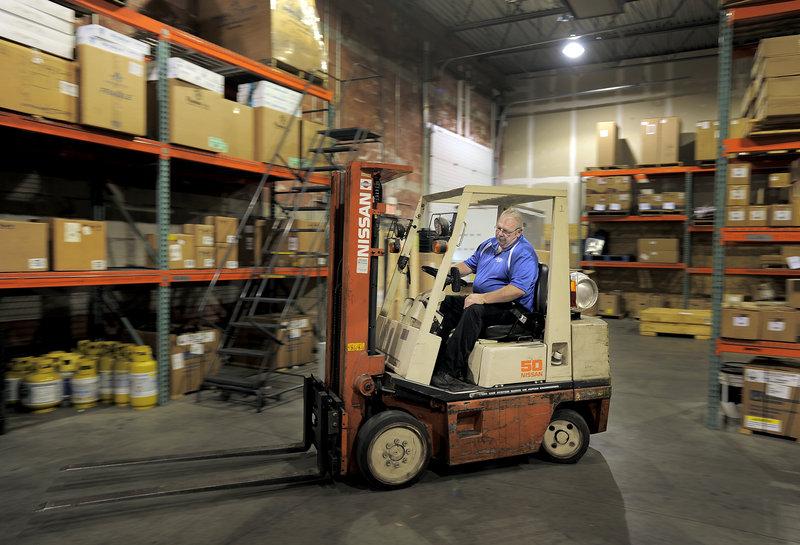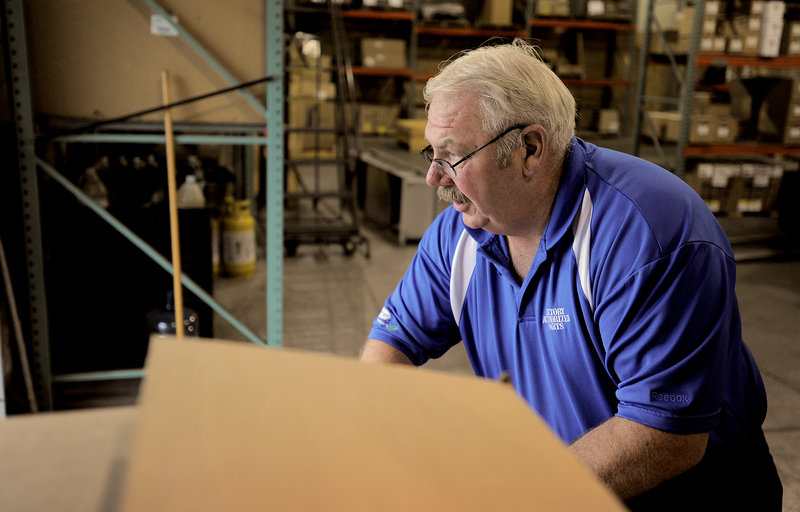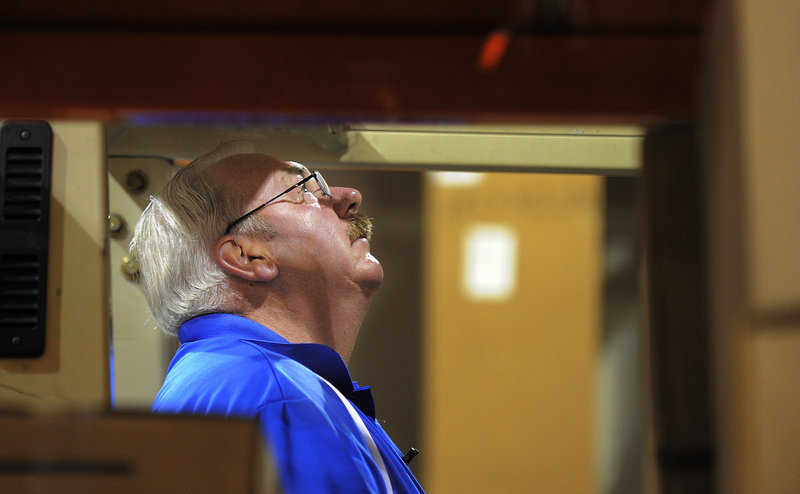One in an occasional series about laid-off Hostess workers
WESTBROOK – Bob Prescott has a hard time finding the right word to describe how he feels about being back to work.
Happy. Elated. Grateful.
Prescott was all smiles last week as he unlocked the front door, turned off the alarm and walked through the small store and warehouse of Distributor Corporation of New England in Westbrook. It’s been a morning routine since May 1, when he put his six-month stint of unemployment behind him.
“I’m lucky I have a wonderful job,” Prescott said. “It’s shocking how fast my days go by.”
Prescott, 58, was one of 370 employees in Biddeford who lost their jobs when Hostess went out of business last November. Hostess received final bankruptcy court approval Nov. 21 to close 33 bakeries, putting more than 18,000 U.S. employees out of work, including 500 in Maine.
Flowers Foods bought portions of the company, including the Biddeford facility where Wonder Bread, cupcakes and Sno Balls were made, but has made no announcement about what it will do with the bakery facility. Twinkies, which were among the snack cake lines purchased by Apollo Global Management and Metropoulos & Co. for $410 million, will return to store shelves July 15.
Before he was laid off, Prescott, who lives in Portland, had been with the company for 17 years as a route sales driver, stocking bread on store shelves between midnight and 3 a.m. Before that, he worked as a commercial fisherman and at local grocery stores.
He had hoped to retire from Hostess, but when the bakery was shuttered, Prescott was forced to re-evaluate his retirement plans.
He quickly found himself immersed in the unfamiliar world of the unemployed: writing and rewriting his resume, combing the Internet for job listings and sorting through various retraining options.
After a frustrating few weeks of unemployment and trips to the Career Center in Portland to learn about retraining options, Prescott decided his best course of action was to go back to school to earn his Class A commercial truck driving license.
Prescott’s driving course at ProDrive in Westbrook was paid for by the federal Trade Adjustment Assistance Program, which assists workers who have lost their jobs as a result of foreign trade or competition. Hostess workers were determined to be eligible for the assistance, which is administered here by the state Department of Labor’s Bureau of Employment Services.
In order to participate in the TAA program, people have to be looking for a job and be able to show that no suitable jobs can be found. Once accepted, their retraining — either in a classroom or on the job — must be in a field where jobs are likely to be available, said Marty Perlmutter, the Rapid Response coordinator for southern Maine and a Career Center consultant.
The Maine Department of Labor currently has $10 million in TAA funds for qualifying workers, including former Hostess workers who have enrolled in the program. In the past, the program has assisted former employees of WestPoint Home, Formed Fiber Technologies Inc., Bumble Bee Foods and Fraser Papers.
The number of former Hostess workers using the program was not available, although Perlmutter said they are seeking training in computer technology, precision machining, medical assisting and medical office work. Some former Hostess workers also are enrolled in adult education programs to improve their English.
‘SO MUCH STUFF TO LEARN’
When it became obvious that finding a new job wasn’t going to be easy, Prescott sat down for a talk with his wife, Nora. He was interested in getting his commercial driver’s license, but knew driving the biggest tractor trailers on the road would mean he might be away for extended periods of time.
They decided it was a sacrifice they were willing to make, so Prescott enrolled at a driving school in Westbrook. The $4,000, 170-hour program was paid for with TAA funds. He continued to receive his weekly $372 unemployment benefits while he was in school.
It was strange to be back in a classroom after so many years, but Prescott said he enjoyed it and the prospect of being hired directly out of school.
After 80 hours of practice behind the wheel, Prescott failed his first road test. He signed up to take the test again three weeks later, but in the meantime had to continue applying for jobs.
That’s when he saw the job at Distributor Corporation of New England, a company with six locations that distributes air conditioning and heating supplies. A day after interviewing with the company and two days after he passed his road test for his commercial driver’s license, Prescott was offered the job.
Prescott’s job requires him to receive and stock supplies, prepare orders and deliver them to contractors as far away as Massachusetts.
“There’s so much stuff to learn, but it’s fun learning,” Prescott said.
He works from 7 a.m.to 4 p.m. Monday through Friday, a schedule he’s never worked in his life.
“I don’t have as many bags under my eyes,” Prescott jokes about his new schedule. “(Getting up early) was a routine I was used to for 17 years. I don’t miss those hours. This is working out well.”
Prescott is making less now than he did at Hostess and less than he probably would driving tractor-trailers, but says it’s worth it to be home at night and weekends.
While he made $22 an hour at Hostess and started his new job at $16.50 an hour, Prescott recently was accepted into a wage subsidy program called Reemployment Trade Adjustment Assistance for people 50 and older who take a job that pays less than they made previously. Under the program, qualifying employees receive half of the wage difference for two years or up to $10,000, Perlmutter said.
Prescott credits the Career Center in Portland with guiding him through the process of getting a new job, from crafting a strong resume to helping him get into the Trade Adjustment Assistance program. Without the guidance, he says he’s not sure what he’d be doing right now.
“I’m just so happy to be working again,” he said.
‘THERE’S NOTHING OUT THERE’
Like Prescott, Sue Tapley of Scarborough thought she would retire from Hostess. Now in her eighth month of unemployment, she’s facing a tough decision about what to do next.
Tapley was four years away from retirement when she lost her job as a mixer at the Biddeford bakery. She had worked at Hostess for 14 years, the first time in years she worked only one full-time job.
Tapley, 58, has until July 20 to decide if she will enroll in school to retrain under the Trade Adjustment Assistance program. She’s seen a career counselor at the Career Center, but has yet to decide what she wants to do.
“I’m down to crunch time,” she said. “I wish I was younger, I really do. If I was younger it would make sense for me to do this (retraining). I think I’m too conscious of the amount it will cost the government for the time I’m going to use it. It’s their investment in me, but it would cost them so much money and I wouldn’t be putting much back into it.”
Tapley still hopes to retire in three years, but if she goes back to school for two years, that leaves only one year to work. She often wonders who would want to hire someone so close to retirement.
She is considering enrolling in one of the certificate programs at Southern Maine Community College. They’re not as expensive, “yet it would give me a step up as far as being re-employed,” she said.
Tapley, who spends much of her time applying for jobs, said she doesn’t see many full-time positions with benefits. The new Market Basket in Biddeford is hiring for $8 an hour, she said, but all those positions are part time.
“I couldn’t even venture a count,” Tapley said of the number of jobs she’s applied for. She hasn’t gotten a single call back for an interview.
“There’s nothing out there,” she said. “It amazes me that they’re saying the unemployment rate is really low. The jobs people are taking are so low-paying I don’t know how they make it.”
Maine’s unemployment rate in May was 6.8 percent, compared to the national rate of 7.6 percent, according to the U.S. Bureau of Labor Statistics.
Before Hostess closed, Tapley was making $16.56 an hour. She’s collecting unemployment now and her husband is on disability and working two days a week. They had to make the emotional decision to sell the house she’s lived in since she was 5. They hope to move into a smaller place once the house sells.
Though being out of work has been tough on her finances, Tapley considers herself fortunate. She and her husband started getting rid of debt a few years ago in anticipation of retirement. Their main expense is their $425 weekly mortgage payment. They also pay $800 a month for health insurance.
Tapley said she recently found out she won’t get the $4,000 in severance, back pay and vacation pay she was owed by Hostess. She wasn’t surprised. The company has said it can’t pay workers for unused vacation time or severance because it wasn’t approved by lenders as part of its wind-down plan.
“I kind of knew it before I even filled out the paperwork,” she said. “This (bankruptcy) judge in New York, he doesn’t care about us. I really think sometimes they think it’s our fault (for striking), so we’re in punishment mode. It’s frustrating.”
Tapley’s family has been supportive, but she’s still feeling the emotional strain of being unemployed for so long. Once upbeat about her prospects for landing a new job, she now feels stuck in limbo.
“It’s a roller coaster. I’m up one day, down the next,” she said. “I’m trying to stay busy, but it’s kind of like you’re between a rock and a hard place. I just don’t know what I’m doing.”
Gillian Graham can be contacted at 791-6315 or at:
ggraham@mainetoday.com
Twitter: grahamgillian
Send questions/comments to the editors.







Success. Please wait for the page to reload. If the page does not reload within 5 seconds, please refresh the page.
Enter your email and password to access comments.
Hi, to comment on stories you must . This profile is in addition to your subscription and website login.
Already have a commenting profile? .
Invalid username/password.
Please check your email to confirm and complete your registration.
Only subscribers are eligible to post comments. Please subscribe or login first for digital access. Here’s why.
Use the form below to reset your password. When you've submitted your account email, we will send an email with a reset code.